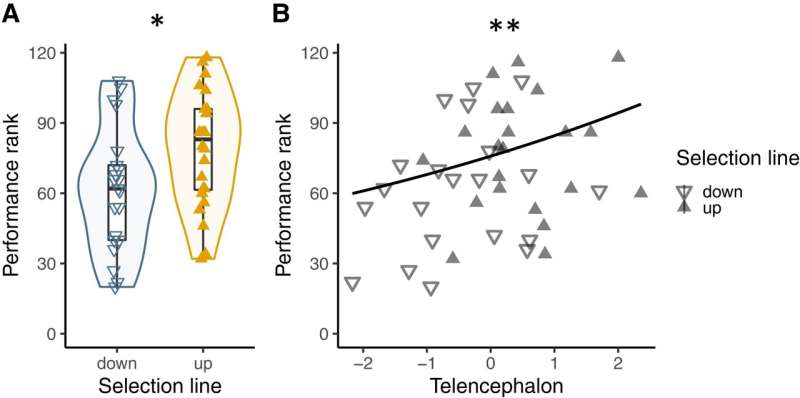This article has been reviewed according to Science X's editorial process and policies. Editors have highlighted the following attributes while ensuring the content's credibility:
fact-checked
peer-reviewed publication
proofread
Study: Executive functions in fish brains improve with experimental expansion of relative telencephalon size

The telencephalon is the part of the brain responsible for executive functions in fish, according to an experimental study published in PNAS Nexus.
Zegni Triki and colleagues used guppies (Poecilia reticulata) that had been selected over five generations to have smaller or larger telencephalons, resulting in a 10% size difference between "up selected" and "down selected" lines of fish. Total brain size was not significantly affected.
The authors then presented 48 male fifth-generation fish from both lines with tests of cognitive flexibility, inhibitory control, and working memory—the three commonly accepted components of the psychological skills known as "executive functions."
To test for cognitive flexibility, the fish were trained to associate one of two colors with food. The food reward was then swapped to the previously unrewarding color. Some 63% of up-selected fish and just 48% of down-selected fish were able to learn the new association within 84 trials.
To test self control guppies were presented with a situation in which a detour around a clear barrier was required to access food. Fish that can delay gratification long enough to detour around the obstacle are said to show some measure of self control. Both lines preformed similarly, but up-selected fish got better at the task over time.
Finally, the fish were challenged with a test of working memory when food was hidden behind an opaque barrier. Up-selected fish showed 60% success over 16 trials, whereas down-selected fish showed just 49% success over 16 trials.
More information: Zegni Triki et al, Experimental expansion of relative telencephalon size improves the main executive function abilities in guppy, PNAS Nexus (2023). DOI: 10.1093/pnasnexus/pgad129
Journal information: PNAS Nexus
Provided by PNAS Nexus




















